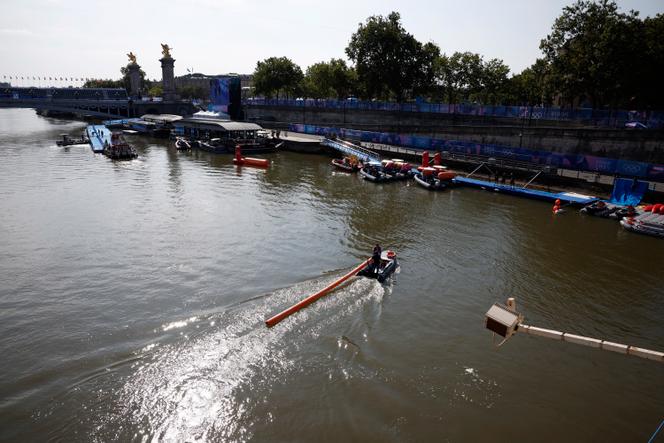


Will the Olympic triathlon become a duathlon? Translation: Will triathletes be able to swim in the Seine, or will they have to make do with pedaling and running along the river's edge? Less than 12 hours before the men's event, scheduled to start at 8 am on Tuesday, July 30, Monday's training session in the Seine was canceled due to the river's pollution. The first session to allow athletes to familiarize themselves with the river, scheduled for the previous day, had also been canceled for the same reason.
"Analyses carried out [on Sunday] in the Seine revealed water quality levels which, for the international federation World Triathlon, do not present sufficient guarantees to allow the event to be held," said the Paris 2024 Organizing Committee and the International Federation in a statement. The deterioration in the quality of the Seine is due to "the rain that fell on Paris on July 26 and 27," they added.
Two bacteria found in feces are being closely monitored: Escherichia coli and enterococci. According to International Federation regulations, these must not exceed 1,000 colony-forming units (CFU) and 600 CFU per 100 milliliters of water respectively. The organizers did not specify the levels measured on Sunday, merely pointing out that "the priority is the health of the athletes." Le Monde found that Escherichia coli levels were still approaching 2,000 CFU on Sunday.
The increased presence of bacteria is directly linked to the continuous rainfall in the greater Paris region on Friday, the day of the opening ceremony, and on Saturday and in the upstream watersheds of the Seine and its tributaries. There was "the equivalent of two weeks' rain in a normal July in Paris" in the space of two days, explained Pierre-Antoine Molina, the prefect in charge of public policy at the regional prefecture at a press conference on Sunday morning. The presser was initially intended as a reminder of the scale of the sanitation work undertaken over the last six years, with a budget of €1.4 billion.
When it rains, some of the overflow from sewers near large urban areas, where wastewater and stormwater are mixed, is discharged into the environment to prevent the mixture from flooding the streets.
In preparation for the 2024 Olympic Games, and so that Parisians can one day bathe in the Seine River and its connecting Marne River from summer 2025, major reservoirs were dug or built. They are supposed to act as a buffer in the event of a storm, until the sewer level drops and the latter can absorb the collected water. The reservoir inaugurated in June behind the Gare d'Austerlitz in southeastern Paris, with a storage capacity equivalent to 20 Olympic-size swimming pools, has prevented the discharge of wastewater into Paris, but not upstream.
You have 63.3% of this article left to read. The rest is for subscribers only.
